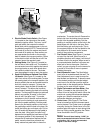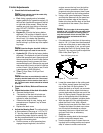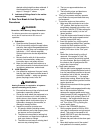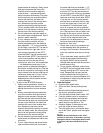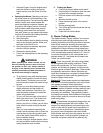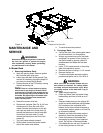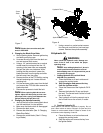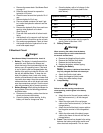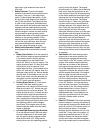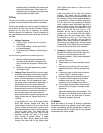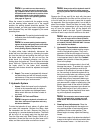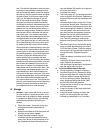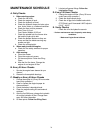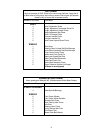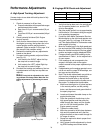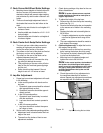20
dard plug-in type automotive fuse rated at
20.0 amp.
7.
Safety Switches:
There are five safety
switches in the electrical circuit which control
the engine. They are (1) the blade clutch
switch, (2) the parking brake switch, (3) the
left and (4) the right steering lever switches
and (5) the seat switch.They operate so that
in order to start the engine, the blade clutch
switch must be off, the parking brake must be
engaged, and both steering levers must be
opened-out to the side in the neutral position.
Once the engine is started, the seat must be
occupied and the parking brake must be
released before either of the steering levers is
folded up to the operating position or the
engine’s electronic ignition will be grounded
out and the engine will stop. Also, the seat
must be occupied before the blade clutch
switch can cause the blades to rotate.
8.
Safety Switch Operation Checks:
The fol-
lowing operational checks should be made
daily.
a. Blade Clutch Switch: Sit in the operator’s
seat. With both steering levers opened-out
in the neutral position and the parking
brake engaged, turn the blade clutch
switch “on” and try to start the engine. The
engine should not start. If it does, the blade
clutch switch must be replaced. If the
engine does not start, turn the blade clutch
switch “off” and start the engine. Now turn
the blade clutch switch “on” and the blades
should rotate. If the blades do not turn, the
blade clutch switch must be replaced, the
seat switch must be replaced or the elec
-
tric PTO clutch must be repaired.
b. Parking Brake Switch: Sit in the opera-
tor’s seat. With both steering levers
opened-out in the neutral position and the
blade clutch switch “off”, release the park
-
ing brake and try to start the engine. The
engine should not start. If it does, the park
-
ing brake switch must be repositioned or
perhaps replaced. If the engine does not
start, engage the parking brake and start
the engine. Swing one steering lever up to
the operating position and the engine
should stop. If the engine does not stop,
the parking brake switch must be reposi
-
tioned or replaced.
c. Left and Right Steering Lever Switches:
Sit in the operator’s seat. With both steer
-
ing levers opened-out in the neutral posi-
tion, the parking brake engaged and the
blade clutch switch “off”, swing the left
steering lever up to the operating position
and try to start the engine. The engine
should not start. If it does, the left steering
lever switch must be repositioned or per
-
haps replaced. Open the left steering lever
to the neutral position and swing the right
steering lever up to the operating position
and try to start the engine. The engine
should not start. If it does, the right steer
-
ing lever switch must be repositioned or
perhaps replaced. If the engine does not
start, Open the right steering lever to the
neutral position and start the engine.
Swing the left steering lever up to the oper
-
ating position and the engine should stop.
If the engine does not stop, the left steering
lever switch must be repositioned or
replaced. Open the left steering lever out
to the neutral position and start the engine.
Swing the right steering lever up to the
operating position and the engine should
stop. If the engine does not stop, the right
steering lever switch must be repositioned
or replaced.
d. Seat Switch: With both steering levers
opened-out to the neutral position, the
parking brake engaged and the blade
clutch switch in the “off” position, start the
engine. Now release the parking brake,
hold down on the back of the operator’s
seat against spring pressure, and swing
one of the steering levers up to the operat
-
ing position. Release the operator’s seat
and the engine should stop. If the engine
does not stop, the seat switch must be
replaced. With both steering levers folded
out in the neutral position, the parking
brake engaged and the blade clutch switch
in the “off” position, sit in the operator’s
seat and start the engine. Turn the blade
clutch switch to the “on” position and the
blades should start to rotate. Raise up
slightly off the operator’s seat and the
blades should stop. If the blades do not
stop when you dismount from the opera
-
tor’s seat, the seat switch must be
replaced.
e. Electric PTO Clutch: This clutch operates
when the engine is running, the operator is
in the operator’s seat and the blade clutch
switch is turned on.This electric clutch is a
fairly trouble free device. If a problem
develops and the blades do not turn, first
check the 7.5 amp fuse in the yellow, 16-
gauge wire between terminal “L” (for the
Gasoline Engine) on the ignition switch
and the hour meter and then investigate
the wiring harness and the connections to



